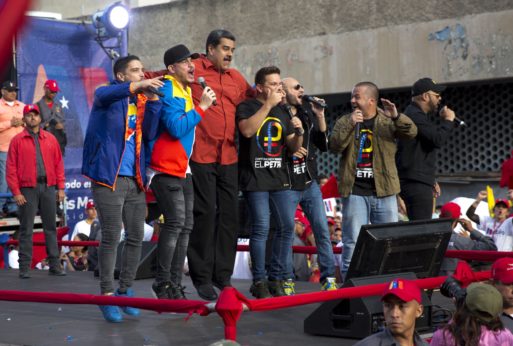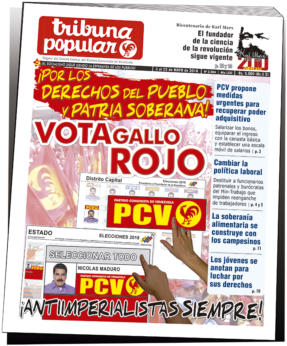
On Sunday, May 20, Venezuela will hold a general election, with or without the permission of the United States and its allies.
The U.S. has formed an alliance, the “Lima Group,” whose purpose is regime change in Venezuela. On Monday, May 14, the countries that constitute this group met in Mexico City and issued a statement denouncing the Venezuelan government as “undemocratic” and demanding that Sunday’s election date be cancelled.
And what a splendid group of “democrats” the Lima Group brings together: The governments of Argentina, Brazil, Canada, Chile, Colombia, Guatemala, Honduras, Mexico, Paraguay, Peru, and St. Lucia. Most of these governments are themselves involved in massive corruption, violent suppression of dissent, or both.
Defending democracy by killing it
The right-wing government of President Mauricio Macri of Argentina is battling labor unions in the streets as it cuts social welfare to the bone, yet the Argentine economy is seen by many as at the point of collapse.
The extremely unpopular Brazilian government of President Michel Temer of Brazil took power in an illegal coup and is widely considered illegitimate by Brazilians. Temer’s government just engineered, by means of a kangaroo court proceeding, the imprisonment and deprivation of political rights of former President Luiz Inácio Lula da Silva, who was far ahead in the polls to win the presidency again in elections later this year.

In Colombia, social justice activists are being murdered by death squads, and opposition leaders face state repression. In Guatemala, the indigenous population, a majority by some criteria, continues to be oppressed by the corrupt and undemocratic government of President Jimmy Morales. Honduras just underwent an outrageously corrupt election; in ensuing protests, scores of people have been killed by militarized security forces, many oppositionists have been jailed and people continue to flee the country.
In Mexico, many suspect that, as has happened in the past, the right wing will rig the coming presidential election to keep the leftist front runner, Andrés Manuel López Obrador, from winning, and the country continues to be wracked by deadly violence. Paraguay has a similar situation to those of Guatemala and Honduras. In Peru, the president was just forced to resign because of a scandal in which he was credibly accused of pardoning former dictator Alberto Fujimori in exchange for immunity from impeachment under his own corruption charges.
Reversing the revolution
The United States, of course, is the instigator of the Lima Group and continues to impose crippling sanctions on Venezuela. There are signs that even military intervention may be in the offing. I will leave it to others to decide whether the regime of Mr. Trump is a paragon of democracy and good government, fit to preach to Venezuela on these subjects.
The oil multinationals and finance capital are also on the move in this drama, however. Former President Hugo Chávez had nationalized some properties of the most abusive multinationals, and they are maneuvering to get their property back if the current left-wing government of President Nicolás Maduro loses the Sunday elections.
Most of the opposition parties in Venezuela, having failed to take power through violence, decided to boycott the elections and appeal to the United States and the “Lima Group” nations to intervene. However, three opposition presidential candidates did jump into the race: Henri Falcón, the former governor of Lara state until he was defeated by a leftist in last year’s gubernatorial elections, used to be a supporter of Chávez’s Bolivarian movement, but has now moved into opposition.
He advocates neoliberal solutions for Venezuela’s economic crisis, such as partial dollarization and new approaches to the International Monetary Fund for help. He is probably the strongest of the opposition candidates in terms of support, but he has been denounced by others on the right for not joining the election boycott.
Another opposition candidate is Javier Bertucci, an Evangelical Christian preacher. He preaches a return of Venezuela to Christian values, a stance that is somewhat undermined by his involvement in corruption scandals in recent years.
The third opposition presidential candidate is another former supporter of the left-wing Bolivarian government, Reinaldo Quijada. He and his party, Popular and Political Unity, broke with the governing left-wing alliance (the Great Patriotic Pole) in 2015 and attacks the government of Maduro and his United Socialist Party of Venezuela (PSUV) from a far left position. He is supported by Venezuelan admirers of Leon Trotsky and others and could gain some votes from sectors of the Chavista base who want stronger pro-socialist measures.
Beating imperialism with more socialism

Maduro is supported for re-election by his own PSUV and also by the second largest party in the Patriotic Pole, the Communist Party of Venezuela. The Communists have their own criticisms of Maduro’s economic policies, but advocates the correction and continuation of the Bolivarian Revolution.
In the May 3 edition of the Communist Party’s newspaper, Tribuna Popular (People’s Tribune), Communist Party General Secretary Oscar Figuera pointed out some of the party’s critiques of Maduro’s policies and made specific proposals that would move Venezuela in a leftward direction to get out of the current crisis.
For example, the government should stop relying on one-time pay bonuses to deal with inflation’s erosion of workers’ buying power, should devolve more power to the working class and small farmer grassroots, and should deal with pressing transportation and health care needs more decisively.
But Figuera used the bulk of his time to emphasize the danger from U.S. imperialism, the Lima Group, and the domestic right. The Lima Group and the U.S., he wrote, “have neither the strength nor the moral firmness, nor the legitimacy to say what’s right for Venezuela.”
For this reason, he said the Communist Party “reject[s] interventionism and call[s] upon the Venezuelan people to teach them a lesson of [our] independence” by massively voting for Maduro and the left alliance, including the many Communist candidates running for the national legislature.










